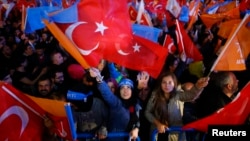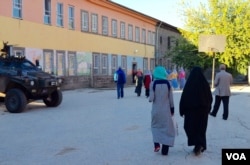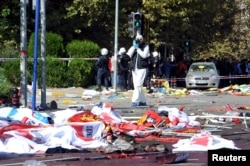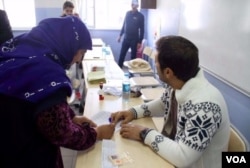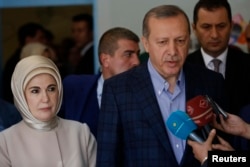The ruling Justice and Development Party (AKP) of Turkish President Recep Tayyip Erdogan swept to a surprise victory in Sunday's snap parliamentary polls, returning the country to single-party rule just five months after it lost its majority for the first time in more than a decade.
With almost all ballots tallied early Monday, the AKP was shown holding just under 50 percent of the vote and projected to win at least 316 seats in the 550-member parliament - a far wider margin of victory than predicted. Preliminary results showed the main opposition CHP party on track to win just over 25 percent.
Another opposition party – the MHP - and the pro-Kurdish HDP also earned seats in the assembly.
Erdogan called the new elections in June after the AKP lost its majority and Prime Minister Ahmet Davutoglu failed to form a governing coalition.
Hours after polls closed Sunday, Erdogan described the outcome as a vote for stability and trust. He also called it a message to Kurdish insurgents in Turkey's southeast that "violence cannot coexist with democracy."
Separately, the prime minister described Sunday as "a day of victory.” “But it is also a day for humility," he said as he addressed supporters in his hometown of Konya.
Sunday's vote followed months of rising tensions between the Erdogan government and a loose alliance of pro-Kurdish leftists, feminists and nationalist Kurds. The opposition's indirect links to the outlawed Kurdistan Workers Party (PKK) came under repeated attack from Erdogan and his allies during the run-up to Sunday's balloting.
Surveys were off
Opinion surveys the day before the vote suggested that Sunday’s election would likely repeat June’s inconclusive result in which no party secured an outright majority, partly thanks to a strong performance by the liberal pro-Kurdish Peoples’ Democratic Party (HDP).
As they cast their ballots, voters said they were in no doubt about the critical importance of the polls, with some in the Fatih district of Istanbul voicing anxiety about increased civil conflict depending on the result.
Worries focused on no party being able to form a government, although many voters expressed deep concern about Erdogan securing a win, arguing that Turkey with all its divisions needs politicians to cooperate and not fight each other.
“I expect we will get the same result as in June and if the parties don’t cooperate and arrange a coalition government, then I really don’t know what will happen,” said 32-year-old Duydu, an environmental engineer, as she voted Sunday morning at a polling station at the Samiha Ayverdi Anadolu Lisesi, a four-story schoolhouse. “We have a lot of problems and the parties need to work together.”
In the election on June 7, the AKP got 258 deputies with a 41 percent share of the vote. It needed an additional 18 deputies to secure single-party rule once again.
Commentator Mustafa Akyol tweeted as the votes were being counted, and it became clear the AKP was heading for a shock win: “People worried about instability.” He argued also that the Nationalist Movement Party (MHP), which saw its vote fall over dramatically had suffered from “dullness,” which “helped the AKP a lot.”
In June, the MHP won 16.3 percent of the vote but with three-quarters of Sunday’s vote counted its share had collapsed to 11.6 percent. It wasn’t alone in suffering: the AKP attracted back enough Kurdish voters to depress the vote of the HDP, which appeared to have seen its support drop to about 10 percent from just over 13 percent in June.
Some analysts said the HDP likely suffered from the renewed hostilities between Kurdish separatist and Turkish authorities.
Crucial vote
Voters turned out early in Istanbul to vote in one of the most significant elections in Turkey’s history.
The poll has been backdropped by rising political violence, jihadist bombings, renewed hostilities between Kurdish separatists and Turkish authorities, an influx of refugees from neighboring Syria and a plunging economy.
One of the first politicians to vote was the liberal pro-Kurdish Peoples’ Democratic Party (HDP) leader Selahattin Demirtaş, who cast his ballot in the working class district of Sultanbeyli in Istanbul.
“I hope the political results will be the most beneficial for all of us,” he told reporters.
“All of the country desires comfort and peace most. It was a tough and troubled campaign period. Unfortunately we also have lost lives,” Demirtaş said in reference to the October 10 Ankara bombing of a peace rally that left 102 people dead. He urged all Turks to vote.
Nationalist Movement Party leader Devlet Bahçeli cast his vote in Ankara at midday, saying: “I think that the election will be a turning point in terms of the nation’s future.”
President Erdogan voted at midday in Istanbul. “This election was necessitated as a result of the unstable outcome of the June 7 elections,” he said. “It has become apparent how important stability is to our nation.”
Concerns
Going into the election there had been mounting worries of possible electoral fraud. Opposition worries were fueled by the tweets of a government whistleblower who uses the pseudonym Fuat Avni. According to the whistleblower government figures had held regular meetings before the election exploring how to manipulate the result. He claimed also that the AKP may try to manipulate the computer-based electoral record system but the Supreme Election Board issued a statement on the eve of the polls insisting the system is reliable and tamper-proof.
Opposition parties also collected vote data, saying they would compare official ballot box results with the data sent in by party members. Before the polls, President Erdogan met regularly with muhtars, the lowest-level local administrators, prompting further opposition claims of possible manipulation plans. “This gives the impression of a possible election fraud that could involve them,” Erdal Aksünger, a CHP adviser told the Zaman newspaper Saturday.
Concerns were raised also about possible disenfranchisement — around 672,000 people who cast votes in the June election are missing from voter lists for Sunday’s poll.
In Fatih, local AKP officials dismissed the idea that the party would have to steal the election to win an outright majority of parliamentary seats, saying voter turnout was much higher this time round than June. “Five months ago the turnout was about 75 percent here,” said Mohamed. “This time it could be as high as 90 percent — and that will favor us, our share of the vote will increase,” he predicted hours before the polls closed.
In Fatih sentiments were running high during polling with some voters saying in the end the elections were about President Erdogan. “He is a dictator,” said 21-year-old Mehmet, a student. “Turkey needs a strong, nationalist leader but not Erdoğan. I voted for the nationalists.”
Karolin, 38, agreed. “This election is about Erdogan,” she said, having just voted for the centrist Republican People's Party (CHP).
In Fatih all was peaceful. But at a polling station in Kocaeli province east of Istanbul police fired tear gas to separate AKP and CHP supporters when a quarrel erupted over relatives helping a frail 80-year-old woman to cast her vote.
VOA's Luis Ramirez contributed to this report from Istanbul.








